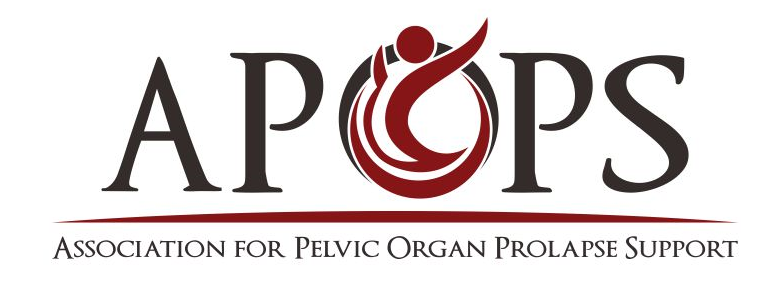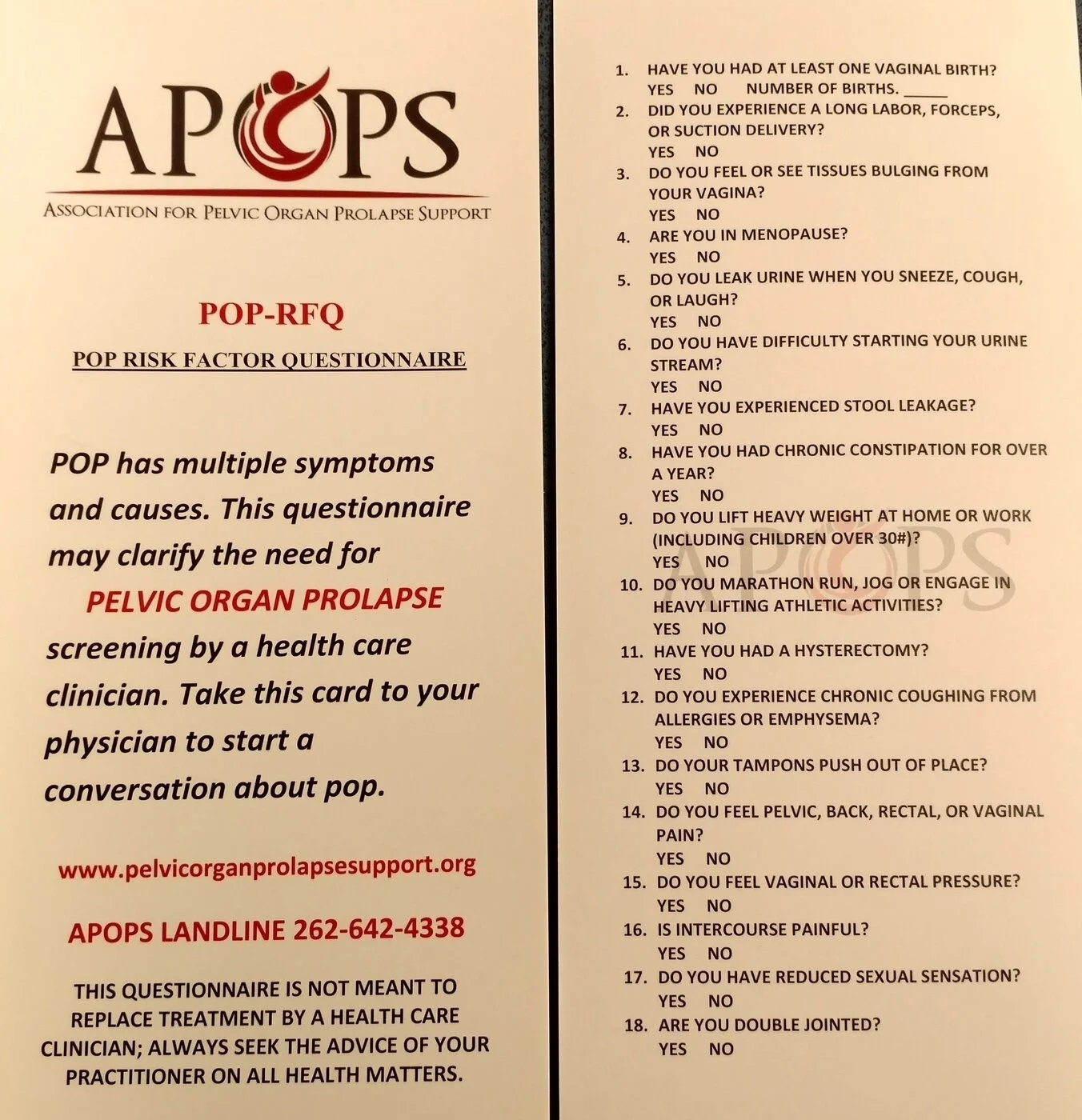POP-RFQ: POP RISK FACTOR QUESTIONNAIRE
A variety of life events, behaviors, and co-existing conditions cause and complicate pelvic organ prolapse (POP). Childbirth and estrogen loss at menopause are the leading causes. All women should be screened for pelvic organ prolapse during routine pelvic exams, but no standardized protocol currently exists.
There are five types of POP, and women commonly have more than one type. Most women are unfamiliar with pelvic organ prolapse until after they are diagnosed with the condition. Typically by that time, the type or types of POP occurring have progressed to a more advanced grade of severity.
APOPS encourages the medical community to both screen for POP during routine pelvic examinations, and educate their patients about POP ahead of the curve. We also encourage women to self-screen with our POP-RFQ questionnaire. When women experience POP symptoms, they should show the questionnaire to their physicians, and request a POP evaluation during a routine pelvic exam. To access the POP-RFQ Questionnaire in your language, click on the appropriate link below. Medical practitioners who would like to add a translation, please reach out via info.apops@gmail.com.
POP RISK FACTOR QUESTIONNAIRE - ENGLISH
POP RISK FACTOR QUESTIONNAIRE - AFRIKAANS
POP RISK FACTOR QUESTIONNAIRE - ARABIC
POP RISK FACTOR QUESTIONNAIRE - DANISH
POP RISK FACTOR QUESTIONNAIRE - DUTCH
POP RISK FACTOR QUESTIONNAIRE - ESTONIAN
POP RISK FACTOR QUESTIONNAIRE - FRENCH
POP RISK FACTOR QUESTIONNAIRE - HEBREW
POP RISK FACTOR QUESTIONNAIRE - HINDI
POP RISK FACTOR QUESTIONNAIRE - ITALIAN
POP RISK FACTOR QUESTIONNAIRE - JAPANESE
POP RISK FACTOR QUESTIONNAIRE - LITHUANIAN
POP RISK FACTOR QUESTIONNAIRE - NEPALESE
POP RISK FACTOR QUESTIONNAIRE - POLISH
POP RISK FACTOR QUESTIONNAIRE - PORTUGUESE (BRAZIL)
POP RISK FACTOR QUESTIONNAIRE - RUSSIAN
POP RISK FACTOR QUESTIONNAIRE - SPANISH
APOPS would like to acknowledge and thank the forward thinking clinicians, healthcare orgs, and companies who assisted translation of APOPS POP-RFQ into additional languages (country of practice).
Clinicians
Afrikaans: Joh-Ann Gouws, PT (South Africa)
Arabic: Dr. Hichem Bensmail (France)
Danish: Sarah Groot, PT (Denmark)
Dutch: Odilia Egbers, PT (MO, USA)
Estonian: Maris Perendi, PT (Estonia)
French: Dr. Hichem Bensmail (France)
Hebrew: Professor Menahem Neuman (Israel)
Hindi: Meenakshi Mohite, MPT (India); Dr. Rupinder Kaur Ruprai (Dubai)
Italian: Dr. Claudio Catalisano (Italy)
Japanese: Dr. Sergio Zetina (Guatemala); Dr. Jimmy Nomura (Japan)
Lithuanian: Dr. Greta Peciulyte (UK)
Nepalese: Dr. Manisha Yadav (Nepal)
Polish: Natalia Wencławek, PT (UK)
Portuguese-Brazil: Quelen Farias, PT (Canada)
Russian: Dr. Lyudmila Tverdikova (Russia)
Spanish: Dr. Jorge De Leon Soto (Guatemala)
Professional Orgs and Companies
Cosmetic Gynecology Global Exchange-Globexx
FEMSelect Ltd.
Women’s Health Physiotherapy Facebook Group
Visualmedics
Pelvic Organ Prolapse (genital prolapse) Denmark Facebook Group



